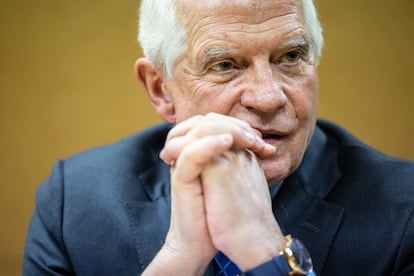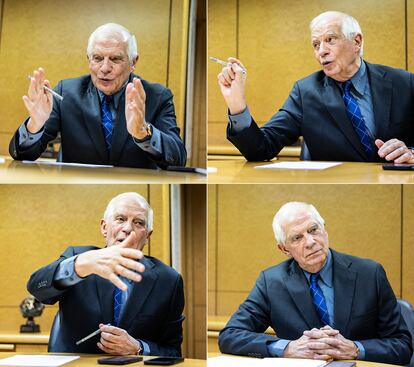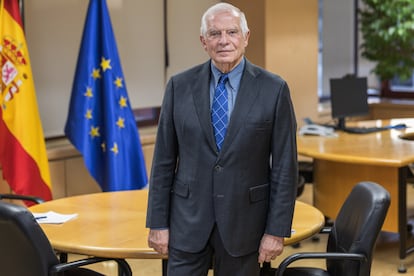Josep Borrell: ‘Trump has not won yet, just as Putin has not won yet, but Europe has to wake up’
The EU High Representative for Foreign Policy calls on member states to increase and accelerate aid to Ukraine

Every story refers to another story which, in turn, refers to another story. Almost all the stories that Josep Borrell, head of European diplomacy, addresses in this interview allude to the seventh circle of the Divine Comedy: that of violence. One war in Europe has just entered its third year: Ukraine. Another in the Middle East — Gaza — is heading for catastrophe. There is a hurricane brewing in the West, with the possible U.S. presidential election victory of Donald Trump. And there is pressure on Europe’s southern shores, with a lurking migration crisis to which the EU has responded with an idea that echoes Goebbels: “Fortress Europe,” with over 1,200 kilometers (745 miles) of supposedly impenetrable walls. Approaching his 77th birthday, Borrell avoids the stiff language of European orthodoxy and with all these risks in the four corners of the world he offers a discourse that, paradoxically, views the greatest danger from within: “What scares me most is the fear of Europeans.”
“It is a diffuse fear. An all-pervading horizon of distrust, a vague feeling of dread. With a war next door and another nearby. With shocks in Africa and the suspicion that migrants may arrive in an uncontrolled manner. With a defense that we outsourced to the U.S., a military umbrella that Trump may close, with cheap energy that will no longer come from Russia, with the certainty that we are losing markets in Asia,” he says.
“We are an aging continent in a young world, hence this mixture of fear and uncertainty. Against that, there are always those who offer a clear, simple, and false answer: the extremists, those hyper-muscled leaderships that tell us: ‘We are strong, they’ll see.’” Borrell stresses: “The European elections will be fundamental.”

Those elections are scheduled for June. But before that will come the spring and the thaw: intelligence reports say that Russian forces have prepared well, and that Ukraine is losing ground. Every tragedy has its prophecy, but the victims only listen when there is no remedy. Who is winning? “Two years ago, Putin started a conflict that was supposed to last a week. And Ukraine resists. Russia came within eight kilometers of the Kyiv parliament, but was pushed back. I have seen the charred rows of its tanks there: it has not won the war, but it has not yet lost it.”
The Russian invasion has triggered a geopolitical awakening in the EU. And yet there is still a feeling that Europeans have not done enough. The EU has delayed decisions on its military support, with leaders dragging their feet because public opinion doesn’t want more either. “EU civilian and military, economic, and humanitarian aid exceeds that of the U.S.,” Borrell counters. “And we have made a qualitative leap: at first we promised helmets; now we send F-16s. If we want Ukraine to resist, we have to give it more aid and faster.”
“Europe has realized that it lives in a dangerous world; it has an aggressive state on its borders. It must ask itself whether it wants a puppet of Moscow in Kyiv, with Russian troops on the Polish border, and the risk of another invasion. Russia is an undemocratic regime capable of wiping out opponents like [Alexei] Navalny, or eliminating its defectors on European soil. Do we want it to arrive at the gates of Europe and control 36% of the world grain market? The Russians have shown resilience: they are used to hardship and are not asked if they would prefer anything other than a war economy. We have to ask ourselves what we can do.”
Are European divisions an obstacle? “Only Hungary, which is reaching security agreements with China, has disassociated itself. And yet it pays its share of military aid to Ukraine and does not veto civilian aid. We have shown remarkable unity. But it is logical that hesitations arise among 27 countries: if we had overcome them quickly, with massive and immediate aid, Ukraine would have been better off. And so would we. How do you win a war against a nuclear power that spends 30% of its budget on defense? Russia is at war with all its consequences. Europe is not at war, but it doesn’t quite understand what this war means for it either. Putin has mobilized all his resources, he has military support from Iran and North Korea, with the economic support of China. Hence my appeal to the member states to make their support consistent with the kind of war we are facing, a mixture of those of the 20th century and the most modern technologies. We need to do more, and quickly: in the next few months the war may be decided. To resist is to win.”

On the other side of the Atlantic, Trump has threatened to break the traditional framework of NATO deterrence. “It is barbaric that he invites Russia to attack those countries that do not meet his conditions. And it is barbaric that there are Republicans who compare the Ukrainian war with the migratory pressure from Mexico. We have to assume responsibilities, increase defense capabilities, and be prepared for any eventuality. Trump has not won yet, just as Putin has not won yet, but Europe has to wake up.”
In addition to Ukraine, Gaza is the other focus of international attention, with 1.7 million Palestinians crushed against a wall. What will Europe do in the event of a catastrophe? “We are already in the midst of a catastrophe. The United Nations has had to suspend humanitarian aid: Israel is using famine as a weapon of war and that is contrary to international law. We said it in Ukraine and it is also true now. Gaza has been razed to the ground: the use of force has been disproportionate.”
Spain and Ireland have called for the suspension of the EU association agreement with Israel if it is proven that human rights are being violated: “It is an extraordinary step forward and hits a raw nerve.” But Europe is unable to drag the U.S. into its demand for a ceasefire, perhaps because there is no common position in the EU either: “At the United Nations the vote was divided, 18 in favor against nine abstentions.”
The weight of history explains the position of Germany at the head of the institutions: the president of the European Commission, Ursula von der Leyen, made a visit to Tel Aviv during which she defended Israel’s right to defend itself without placing any limits on the government. “The catastrophe in Gaza is not the result of an earthquake or a flood: it is the consequence of devastating military action. Hamas is an idea, and an idea is only fought with another idea: [Israeli Prime Minister Benjamin] Netanyahu’s plans for Gaza are unacceptable. The seeds of hatred are being sown for generations. It is an open secret that the Israelis funded Hamas and played at dividing the Palestinians. Or that the U.S. position is taking its toll on Biden among the young Democratic electorate. And that Von der Leyen’s trip, with such a completely pro-Israeli position, without representing anyone but herself in a matter of international politics, has carried a high geopolitical cost for Europe.”
Borrell concludes with a couple more messages for Von der Leyen. One: “You announce that there will be a Commissioner for Defense, but the Commission has no competence in defense matters, only in the defense industry. I would like to know what legal basis your proposal has.” And two: “It is legitimate for her to want a second term, but she should not pretend to take personal credit for all the successes: there is a college of commissioners of different political colors who have taken decisions. She should be more careful with neutrality when she is both president and candidate. She should focus on ensuring that her party, the European PP, does not fall into the temptation of allying itself with the extremists, thus abandoning its traditional alliances.”

Sign up for our weekly newsletter to get more English-language news coverage from EL PAÍS USA Edition
Tu suscripción se está usando en otro dispositivo
¿Quieres añadir otro usuario a tu suscripción?
Si continúas leyendo en este dispositivo, no se podrá leer en el otro.
FlechaTu suscripción se está usando en otro dispositivo y solo puedes acceder a EL PAÍS desde un dispositivo a la vez.
Si quieres compartir tu cuenta, cambia tu suscripción a la modalidad Premium, así podrás añadir otro usuario. Cada uno accederá con su propia cuenta de email, lo que os permitirá personalizar vuestra experiencia en EL PAÍS.
¿Tienes una suscripción de empresa? Accede aquí para contratar más cuentas.
En el caso de no saber quién está usando tu cuenta, te recomendamos cambiar tu contraseña aquí.
Si decides continuar compartiendo tu cuenta, este mensaje se mostrará en tu dispositivo y en el de la otra persona que está usando tu cuenta de forma indefinida, afectando a tu experiencia de lectura. Puedes consultar aquí los términos y condiciones de la suscripción digital.









































